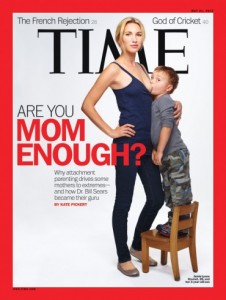 Now that the actual Time Magazine article is out on newsstands, I wanted to share my perspective on the article, and not only about the cover.
Now that the actual Time Magazine article is out on newsstands, I wanted to share my perspective on the article, and not only about the cover.
And I would love to hear yours.
To sum it up, I felt as though the article itself was an unfair representation of both Attachment Parenting, and Dr. Sears. The underlying tone was one of mockery, and not unbiased reporting. It paints Dr. Sears as an overly religious man, who is now profiting tremendously from the sales of Attachment Parenting products, where his initial interest in the principles of AP was sparked by reading about an unscientific observation of a tribe in South America. And from there he’s launched an empire that has all of these naïve parents blindly following his lead.
Dr. Sears did not invent Attachment Parenting. Attachment Parenting is not new. He HAS been in the forefront of bringing awareness to these principles in a culture that has prioritized other parenting practices, and I commend him for that.
Unfortunately, the article falsely states that there is no research to support the benefits of these practices. This is simply not true.
About six months ago, I interviewed Dr. Linda Folden Palmer, author of The Baby Bond: The New Science Behind What’s Really Important When Caring for Your Baby, about attachment parenting. (By the way, her book alone has over 1,200 references to scientific journals supporting these practices). One of the questions I asked her was, “What was the most surprising thing you found when you began researching this topic for your book?”
I shared her response on a previous post. (the 3 minute audio response is available on that post).
Her response surprised me as well. In a nutshell, she could not believe the abundance of evidence-based research that already existed that consistently showed the benefits of attachment parenting practices on a baby’s physical and emotional long-term health. She had assumed because her pediatrician didn’t emphasize the attachment parenting practices she instinctively did with her son, that she was going to have to search far and wide to find physicians willing to do research to see what they’d find out.
“Hidden in plain view” is a term I often hear about things that go against “societal assumptions” and the answers are there only if you start to look. That is why I am so passionate about Conscious Parenting. It means asking some questions, and not blindly following what “they” say. It is about being thoughtful and deliberate, about what you choose to do with your family.
Besides Dr. Palmer’s work, there is a lot of other evidence-based research to support Attachment Parenting principles.
According to myriad research about brain development and early parenting practices, in reality this little boy on the Time Magazine cover will likely grow up see the world as a place to be explored, live outwardly and connect well with others, instead of having the instinctive orientation that the world is to be feared, and everything and everyone is not to be trusted.
At a basic scientific level, every experience in a young child’s life orients them (neurologically and emotionally) towards either “growth” or “protection.” Especially up until age 6, during which the child’s brain wave activity is in the delta and theta range (similar to an adult brain’s dream state). The predominant orientation pattern established before age 6 is the one to set the stage for the rest of the child’s life. Some are familiar with the term “imprinting.”
I myself, am oriented towards “protection.” I work daily to try to shift that deeply ingrained neurological pattern towards growth and openness. I know firsthand how hard that is to do. They affect my daily life in many ways, especially in my relationship with my spouse. When I am stressed or overwhelmed, no matter how much I try to be different, my natural instinct is to revert to this well-established pattern. I am aware of it (which is the first step) but it is incredible how powerful that pull is to stay in that pattern when push comes to shove.
And I think to myself, how wonderful for this little boy, and my little girl, to not have to deal with the struggles that I face around these patterns.
It is only because I am very familiar with Attachment Parenting, that I can point out these observations of the article.
The general population who reads this article will, unfortunately, walk away with an inaccurate perception of Attachment Parenting. (if they don’t read this post, that is….) ☺
I pray that I can do my part to represent Attachment Parenting in a more balanced light, and let all parents know that what works best for YOUR heart, is the best for YOUR family. Having an open mind, and an open heart, to learning about other ways of doing things, and even changing how you’ve parented in the past, is all good.
For me, I’m so grateful for having respectful and open discussions about parenting, as it challenges me to really think about how I feel. In some cases, I’ve changed how I have parented because of them. In other cases, discussion and learning has further solidified my stance on my parenting practices.
Either way, I’m not afraid to admit when I wish I had done something different in the past. I strive daily to do the best that I can, and learn from every day. It’s all we as parents can do, whether we practice Attachment Parenting principles or not.
Like I said in the television interview last week, the best advice I would have for parents is to follow your heart. If you do that, your child will feel it. If you are conflicted about your parenting, it’s a sure sign you are usually in a battle between your head and your heart, and your child will feel that as well.
Early on as a mom, I battled between my head and my heart. Often. I now always consciously choose my heart. The only regrets I have are the early parenting times I let my head win over my heart. While I still make mistakes now, I no longer have regrets.
That’s my wish for all parents.

I didn’t read the article but based on the cover, I’m not surprised by how Dr. Sears and Attachment Parenting was presented. You said it best when you advise parents to follow their heart. Not everything works for every family, or for each child. Doing what feels right – in the moment – is the best gift we can give to our children. Questioning and being curious about other ways to do things might be healthy from a modeling standpoint, but ignoring our maternal instinct usually gets us in trouble (at least in my experience).
I couldn’t agree more. My most stressful times as a mom were when I ignored my maternal instinct and did what I thought I was “supposed” to do.
If we are going to talk about the article, we have to start with the fact that Attachment Theory is not being distinguished from Attachment Parenting. Attachment Theory was developed by John Bowlby in the 50’s and researched by Mary Ainsworth. Bowlby was interested in distinguishing healthy from unhealthy forms of attachment between parent and child. Whether he would think the Sears’ Attachment Parenting was healthy or unhealthy is an open question.
In any event, there is a distinction between keeping children close because they are happy that way and desire it and keeping them close because we feel pain at their maturation and increased desires for independence and choice. Bowlby evaluated parent-child attachment on a case by case basis, and so should we. One size does not fit all. (www.smartlovepress.com, http://www.mommydaddyihadabaddream.com).
Martha Heineman Pieper, Ph.D.
Yes, it is very important for people to realize the distinction between attachment theory of Bowlby and attachment parenting. The research I am referring to in the post is not Mary Ainsworth’s research – so thank you for bringing it up so that I can clarify that point.
I’m referring to research that has been conducted on many aspects of attachment parenting practices on the physiology of children, from their immune system, to their endocrine system, and brain development.
Wow – no regrets! I’m trying to follow my gut more than my head now in all areas of my life and it has been making a big difference in my happiness.
I love that you have interviewed Linda Palmer! I have her book and refer to it with my classes – she is one of our local AP heroes! I figured as much from the cover that the article could have that undertone… too bad TIME. A couple of years ago the magazine Pathways had an article that stated the pendulem is swinging more our way, natural remedies, parenting, etc… but it appears this is in pockets and not nationally otherwise the editor and the author of the article via TIME would have done more research, right? Sharing your post, as I think my signing families can appreciate!
Yes, I love Linda as well. She is such a gift to the parenting community, as she really dives into the science, with an open mind.
Glad that the post was helpful!
“…what works best for YOUR heart, is the best for YOUR family. Having an open mind, and an open heart, to learning about other ways of doing things, and even changing how you’ve parented in the past, is all good.” WELL SAID!
I don’t understand why we need to tear each other down about parenting? It’s hard, and we all do it differently, and no one is perfect, and we are not always right. I think when we close our minds to what others are saying, becoming entrenched in defensiveness, we lose sight of what’s important. Our children. Being a mother is not about us, it’s about them.
Thanks for this post.
Well put!! I agree completely.
I hate labels. In all arenas. But in this one? Why can’t it just be called ‘Parenting’. Do what you feel is best. When has there ever been a manual that tells us exactly what we need to do? This is what our maternal instinct is for, and when we’re still not sure we have friends and family to talk to.
I have always trusted my gut. No, I take that back. Twice I didn’t and I regretted it both times.
Quiet your mind, listen to your heart. Everything will follow.
Great article!